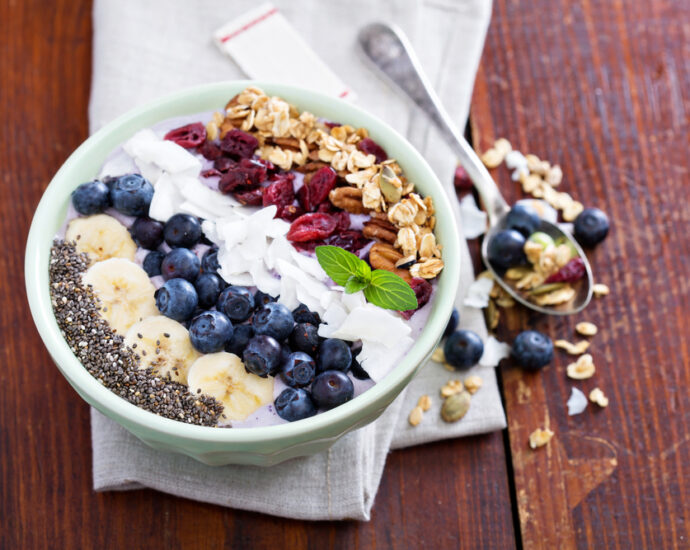Starting your day with breakfast is like giving your body a jumpstart for a productive and energetic day ahead. It’s often touted as the most important meal of the day, and for good reason.
Page Contents
Let’s break down why you should never skip breakfast:
- Fuel for Your Brain: Your brain relies on glucose (sugar) for energy, and it doesn’t store much. When you wake up, your blood sugar levels are low, so a nutritious breakfast replenishes them. This helps improve concentration, memory, and cognitive functions.
- Metabolism Kickstart: Eating breakfast revs up your metabolism. It signals to your body that it’s time to start burning calories. This can be especially helpful if you’re trying to maintain or lose weight.
- Energy Boost: Breakfast provides you with the energy you need to tackle your daily tasks. It replenishes glycogen stores in your muscles, so you feel more energized and less fatigued.
- Improved Mood: Eating in the morning can positively impact your mood. It helps regulate your blood sugar levels, preventing irritability and mood swings.
- Better Nutrient Intake: Breakfast is an excellent opportunity to get essential nutrients like vitamins, minerals, and fiber. Foods like whole grains, fruits, and dairy provide a wide range of nutrients that your body needs to function optimally.
- Weight Management: Contrary to the belief that skipping breakfast can aid weight loss, studies have shown that people who eat a balanced breakfast tend to make healthier food choices throughout the day and are less likely to overeat later on.
- Stable Blood Sugar: Breakfast helps regulate blood sugar levels, reducing the risk of developing type 2 diabetes.
- Improved Performance: If you’re an athlete or have an active day ahead, breakfast is crucial. It provides the necessary carbohydrates and protein for muscle recovery and endurance.
- Healthy Eating Habits: Establishing a routine of eating breakfast sets a healthy pattern for the rest of the day. It encourages mindful eating and reduces the chances of snacking on unhealthy foods.
- Digestive Health: Breakfast kickstarts your digestive system after a night of fasting. Fiber-rich foods, like whole grains and fruits, promote regular bowel movements and good gut health.
Components of a Healthy Breakfast
A healthy breakfast sets the tone for your day and provides your body with the essential nutrients it needs to function at its best. Here are the key components of a balanced and nutritious breakfast:
- Protein: Including a source of protein in your breakfast helps keep you full and satisfied. It also aids in muscle repair and growth. Good options include eggs, Greek yogurt, cottage cheese, tofu, lean meats, or plant-based protein sources like beans and nuts.
- Complex Carbohydrates: Complex carbs provide a steady source of energy and fiber, which aids in digestion and keeps you feeling full. Opt for whole grains like oatmeal, whole wheat bread, brown rice, or quinoa.
- Healthy Fats: Healthy fats are crucial for brain health and overall well-being. Avocado, nuts, seeds, and nut butter are excellent sources of healthy fats. You can spread almond butter on whole grain toast or add sliced avocado to your breakfast.
- Fruits and Vegetables: These provide essential vitamins, minerals, and antioxidants. Berries, bananas, apples, spinach, and tomatoes are just a few examples of fruits and veggies that can be incorporated into your breakfast. They can be added to smoothies, omelets, or eaten on the side.
- Dairy or Dairy Alternatives: If you tolerate dairy, low-fat or unsweetened yogurt and milk can be good sources of calcium and protein. If you prefer dairy alternatives, choose unsweetened almond milk, soy milk, or oat milk.
- Fiber: Fiber aids in digestion, helps maintain steady blood sugar levels, and keeps you feeling full. Whole grains, fruits, vegetables, and nuts are all high in fiber. A high-fiber cereal or whole grain bread can be a good addition to your breakfast.
- Hydration: Don’t forget to hydrate in the morning. Water or herbal tea is a great choice. You can also include a glass of 100% fruit juice, but be mindful of added sugars.
- Variety: Rotate your breakfast options to ensure you get a wide range of nutrients. This prevents boredom and ensures you’re getting a diverse array of vitamins and minerals.
Here are a few healthy breakfast ideas that incorporate these components:
- Oatmeal with Berries and Almonds: Cook oats with almond milk, top with fresh berries, and a sprinkle of chopped almonds.
- Greek Yogurt Parfait: Layer Greek yogurt with granola and sliced bananas. Drizzle honey and add a handful of berries.
- Vegetable Omelet: Whisk eggs, sauté veggies (e.g., spinach, bell peppers, onions), and pour the eggs over them. Cook until set and fold in half.
- Avocado Toast: Spread mashed avocado on whole-grain toast and top with a poached egg and a sprinkle of black pepper.
- Smoothie: Blend spinach, banana, Greek yogurt, almond butter, and a handful of frozen berries with water or almond milk.
Remember, portion control is essential, so be mindful of portion sizes to avoid overeating. With these components in mind, you can create a breakfast that not only tastes delicious but also supports your overall health and well-being.
READ MORE: Health Benefits Of Eating Oatmeal Daily
